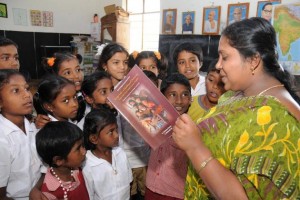Putting education before tradition
View(s):Some Narikurava parents are putting their nomadic life on hold to give their children a good education
Kurathi Magan, a 1972 film, featured a Narikurava boy staying with a family outside his community for the sake of his education. After almost 40 years, the situation holds true for Narikurava parents who dream of sending their children to school.

Learning for a bright future. Photo: M. Moorthy
Abandoning the nomadic life that has been favoured by their community for years, some Narikuravars are prepared to settle down for the sake of their children’s education. As they go about scouting for lands and building houses, they often live away from their children. “I used to live under a big tree with my parents,” says Madhavan, a 12-year-old. “My father is an astrologer and my mom makes jewellery.” He is living away from his parents so that he can attend the government bridge school for dropouts at Mullipadi village near Manapparai.
In the last four months, nine children from the Narikurava community have joined the shelter for underprivileged children run by Deva Kirubai Social Help Association, 50 km from Tiruchi. “These children need little time to settle down as they are usually outspoken and inquisitive,” says Aarthi Kumar, a social worker who helps them with studies and extracurricular activities on weekends.
Coming to grips with change
While the children have adapted themselves quickly, it is the parents, used to moving together as a family, who find it hard to live apart from their children. Their eagerness to visit is often dampened by the transportation costs involved. “We are used to taking our children along when we move from village to village to sell wooden beads,” says Muthazhagu, mother of Kanna, a resident at the shelter. “We could not afford to send them to school; sending them to a shelter with free education was the best we could do. We miss our children, but they speak English now and I am proud of that.” Like her, many of the Narikurava parents are still coming to grips with the changes in their way of life, settling down and staying away from their kids.
Children from a Narikuravar settlement at Devarayaneri attend the Thiruvalluvar Gurugula Elementary School close by. Unlike their peers at Deva Kirubai, these children are entrenched in the Narikurava way of life and pick up the native language quickly. They learn trades like Kili Joshiyam, palmistry, mat weaving and jewellery making from their parents. “I like going to school because I learn rhymes and I get to colour pictures every day,” says Suji, a six-year-old. “I will be a doctor when I grow up.”-thehindu.com
Follow @timesonlinelk
comments powered by Disqus



















